San Diego State’s Carin Crawford, St. Francis Brooklyn’s Alana Burgess: If You Can See Her You Can Be Her
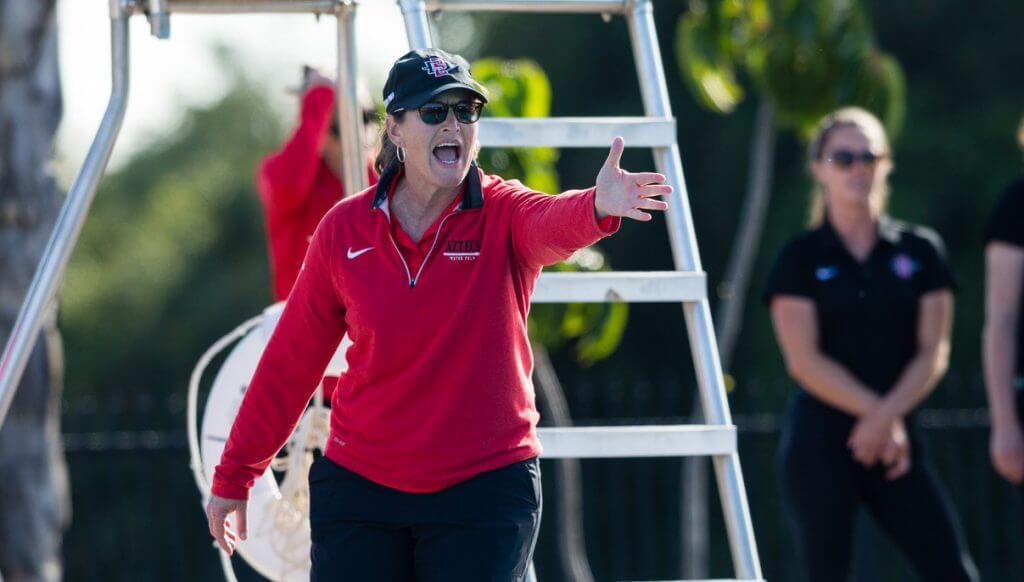
PRINCETON, NJ. The relationship between player and coach can be both rewarding and challenging. Establishing common ground is not always easy—especially when considering the outsized influence of a previous coach.
And then, the player becomes a coach in their own right, and the impact of lessons learned—and mutual respect earned—becomes clear.
These are the rewards that Carin Crawford, head coach for the San Diego State women’s water polo team, has enjoyed over two decades leading Aztec polo. A number of her former players, including Meghan Poland at Indiana and Alyssa Diacono is at Mercyhurst, are now making their way up the coaching ranks.
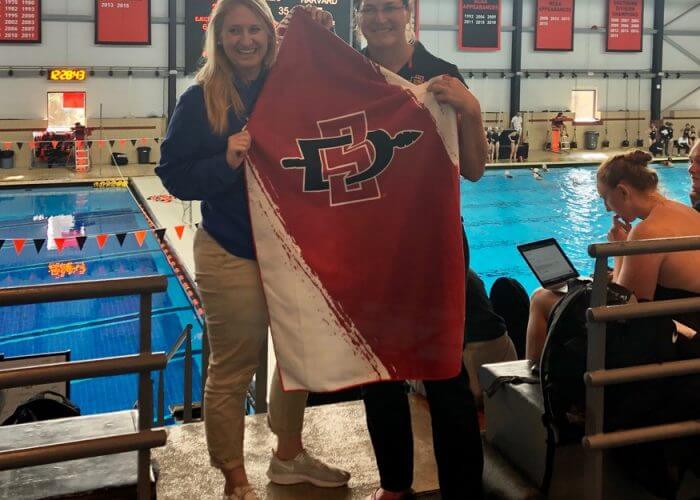
Alana Burgess and Carin Crawford remain Aztecs. Photo Courtesy: C. Crawford
There’s also Alana Burgess, new head coach for the St. Francis Brooklyn women’s team, whose father Randy for many years was one of the most influential coaches in California.
Since playing four years (2009-2012) for Crawford, the younger Burgess has developed a coaching resume of her own, with stints at the Menlo School, Stanford Water Polo Club and—after a move East in 2018—the Terriers.
Swimming World spoke with both coaches follow a meeting of their teams at the 2020 Princeton Invitational, a 16-6 Aztec win. The broad-ranging discussion touched on San Diego State’s last visit to New Jersey, the particular challenges of being a woman coaching in collegiate sports and how coach and former player enjoy a new relationship as peers sharing a common burden: making their teams better.
– The last time San Diego State was in Princeton was 2008—and Alana was a high school senior on the verge of joining the Aztecs.
Carin Crawford: It has been a long time since we’ve been back to Princeton. That team made it to the NCAA tournament—the Elite Eight; the 2007 team [went to the] Final Four.
That was a really good era. We had some great players back then, and obviously a good class coming in, with Alana and Kelly Campoli and Meghan Poland and Leanne Ford. That success the last time we were here carried over to our recruiting.
For me, it’s always been hard to recruit from Coronado—the storied program that has sent athletes off to the most elite colleges and universities. For a while, Alana’s dad, Coach Burgess, had the more Olympians out of Coronado High School than any other high school in the nation.
I was honored and flattered that the legendary Randy Burgess felt that San Diego State would be a place for his daughter to play—and that I would be a good coach for her. That was truly an honor to be entrusted with Alana’s collegiate experience and her development.
– Alana, your dad has been a great influence on your career—one that intertwined with your time as an Aztec.
Alana Burgess: My high school experience gave me a great foundation, and it only grew being able to compete at San Diego State, where we were constantly challenged by top teams in the nation from the MPSF (Mountain Pacific Sports Federation).
Back in those days, we were winning 20 games a season, and when we got a good win, it was a good win.
It was awesome to stay local, be competitive and attend a good academic school.
– In San Diego water polo, the Aztecs and the Tritons of UC San Diego can never escape each other.
Crawford: You may not know this, but I’m a Triton! I played for Denny Harper in the late 80’s and felt that my group of teammates, as well as those who came before me, were responsible for putting Triton water polo, on the women’s side, on the map.
[39 Years And Counting In The Triton Family]
I’m really happy to see their ascendance again—although, not when it comes at our expense in the [yearly] Harper Cup. We had won it 13 years straight and now we’ve dropped five of the last six. They’ve had some great recruiting classes, and it’s nice to see that the university has moved to DI and now has scholarships to put behind their recruitment effort, which has helped them a lot.
But we’re looking to get back on top and bring the Harper Cup back home. In Alana’s time at SDSU we were on our streak [and] had never lost the Cup.
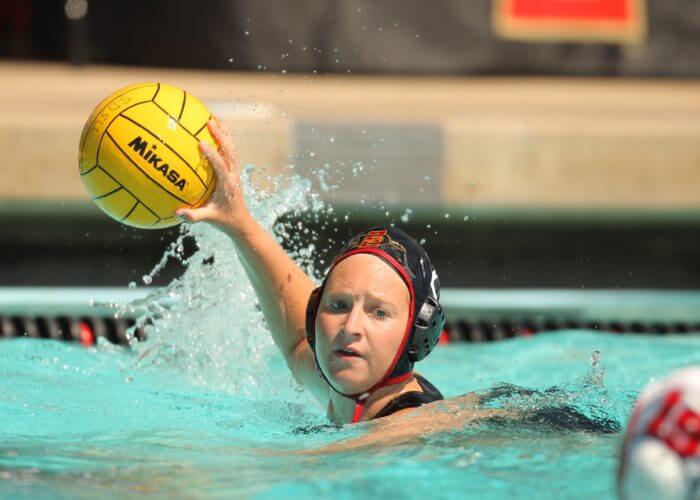
Burgess during her SDSU playing days. Photo Courtesy: Stan Liu
Burgess: Back then even though UCSD wasn’t that competitive—we were winning the Harper Cup by four or five goals—it was a game fueled by passion. You really wanted to defend your city.
Crawford: It brought out the best in both teams.
– Rivalries do bring out the best in opponents, though there’s been a shift since Alana played at SDSU, as the Aztecs have moved from the MPSF and now compete in the Golden Coast Conference (GCC).
Crawford: The MPSF is obviously a tough conference to be in because no national champion [has been] crowned outside of the Pac12 teams in the conference, in fact only three teams have won it. Only LMU [non Pac12 team] has made it to the final, in 2004, and that was a four-team championship, so they had to get one win to get to the championship game.
The way I got sprung from the MPSF is that our school was trying to make a deal to go Big East in football and Big West in all other sports. Since we were MPSF, we didn’t have to wait two years to be released from our conference commitment, so we went ahead of the rest of the teams at SDSU.
When the football deal fell through, we couldn’t stay in the Big West. We were then without a conference. The MPSF wanted us back, but there was other movement going on with the break-up of the WWPA (Western Water Polo Association) and the disparity between DII and DI schools. It made sense to align conferences based upon division—DI and DII. It also made sense from location; West Coast conference schools and Mountain West conference schools, so it brought like schools together, with a few strays.
When Fresno State added water polo, that was another Mountain West conference school. It made sense [to join the GCC] and it’s been a really good thing. We sat out our two-year waiting period before we got the automatic bid to the NCAA tournament, and it’s changed the way I coach.
When we were in the MPSF, the years we made it to NCAAs, every game felt like: If we lose this game, our hopes for an at-large bid are out the window. It’s higher odds than thinking you’re going to run through the field and win an MPSF title.
Now, I coach like my other colleagues do—building towards conference, with regular season games leading to a championship. It makes it easy to experiment with line-ups, to give young players some experience, feeling that not every game is devastating—we think of them as building on a foundation to peak at the end of the season.
We’ve had great success. The first four years in the GCC we swept the regular season, then in 2016 also won the conference championship that was hosted at SDSU. In all my years of coaching, that was the first time that I got to jump into the pool and celebrate a championship. We had a lot of success but never won a conference championship [before that].
– But there is something to be said to regularly facing—and beating—some of the top teams in the country, which are almost always in the MPSF.
Burgess: There’s something unique about being able to play games that matter against the best teams in the country. It’s going to be emotional either way you come out of it, and there’s going to be games when you get beat up and those where things are going your way. All around—win or lose—that’s a great learning experience.
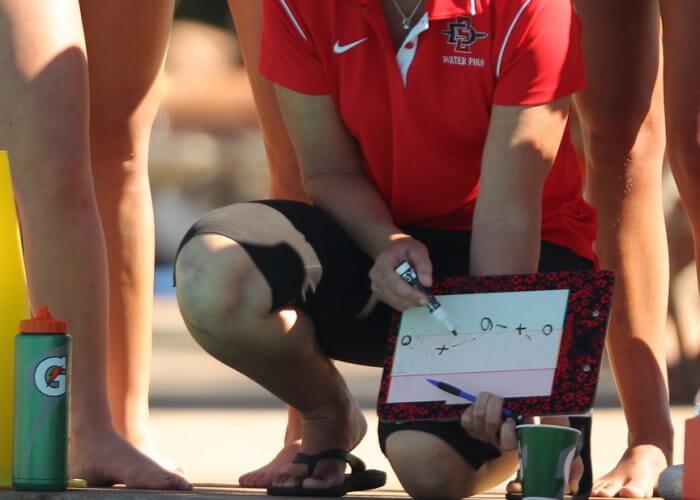
Crawford on the pool deck. Photo Courtesy: SDSU Athletics
Even when we got last place at MPSF, we felt like we gave it our all against the best teams in the country. We’re nationally ranked top eight. For a while, the top eight teams in the country were the eight teams in [the MPSF].
Crawford: You were on the team [in 2011] when we played at San Jose State. We played Cal in our first-round game to a one-goal loss, and Cal ended up going on to win [MPSF] championship. There was one goal between the last place team and the first-place team.
– You’ve been a coach long enough that not only have you had many players come through your program, you now end up coaching against them. Is that a happy experience?
Crawford: It’s an incredibly happy experience because I’m a big champion of women doing great things as athletes and as students but especially women in coaching. With WOWPAC, Susan Ortwein and I very intentionally tried to cultivate, encourage and educate young women. We have an annual all-women coaches’ clinic; WOWPAC stands for: Women of Water Polo and Coaching. We’re an affiliation of women coaches who intentionally support each other.
It’s not that there aren’t a lot of good coaching clinics, and we don’t just talk about issues related to women coaches. But there is a support network which is important because there are a lot of barriers and challenges.
Coaching is very much a male bastion—there’s no denying that—so how does a woman fit into a profession that’s largely been defined by male characteristics? This is commonly researched in the corporate world. If you’re a woman and president of a company and you’re a strong leader and forceful and demanding, you’re seen as a bitch. Yet, those same characteristics used to describe a male coach are all virtues—they’re all the right characteristics.
When I was a young female coach, I didn’t realize how tricky that was. And how I had to navigate it without being conscious of how I was treated differently [by my peers] or how refs might have treated me differently.
Now that I have a few years under my belt, I’m more deliberate about understanding that dynamic. That’s good experience to share with young women coaches—and to let them know that they have every right to pursue this profession in the way they want to. You don’t have to be like men but if you want to be strong and dominant and demanding, that’s perfectly okay.
You don’t have to apologize for it.
20 years in, I’ve been in coaches’ clinic environments with a lot of men and I’m nervous about raising my hand. In an all-female environment, we try to break down that intimidation.
– From your perspective as a young coach in the sport who happens to be a woman, what do you take away from this?
Burgess: About WOWPAC, unfortunately it’s something I’ve never been able to attend. Ironically, I’ve always had coaching scheduled or—now that I’m out on the East Coast—it’s more difficult [to get to]. I’m lucky to have Carin and Susan, because I did work for her up in Norcal when I was coaching with Stanford club. I can reach out to them at a moment’s notice with questions about water polo life, or being in the situations that Carin was talking about earlier—Hey, I’m not sure how to handle this because my presence is a bit different than my co-workers.
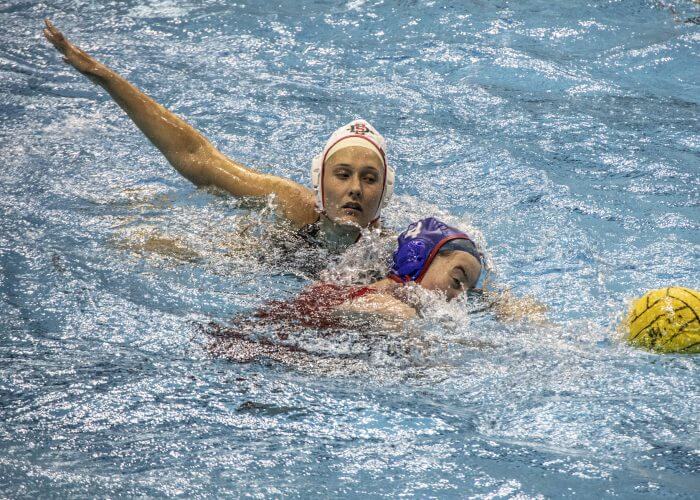
Aztecs (white cap) and Terriers clash. Photo Courtesy: Nathan Feder
I’ve been fortunate to have them in my life as a resource, and that’s been great.
As an athlete having Carin as our coach—[she] may have been the only woman in MPSF. I don’t even think there were female assistants for the most part. It was a rare sighting but the good news is that you’re seeing more and more women that are getting coaching roles, both head and assistant.
– There may be more women as assistant coaches, but is the trend for more women becoming head coaches?
Crawford: Men have a two-track coaching opportunity. A lot of men are hired to coach women’s teams but there’s virtually zero statistically speaking women coaching men [exception: McKendree’s Colleen Lischwe].
[On The Record with Colleen Lischwe, Head Coach of McKendree Men’s and Women’s Water Polo]
That speaks to the difficulty of women navigating through this profession. WOWPAC is an effort to educate and encourage and mentor women to stay in the profession to build up a good pool of candidates. Sometimes we’re asked for a list of women candidates; Susan and I didn’t really have a list.
So that was a point of WOWPAC; let’s get a list of who’s willing to accept a position on the East Coast or to get out of their comfort zone. The opportunities are there; we need to cultivate a pool of coaches.
There’s the Tucker Center for Research on Girls & Women in Sport. They put out a report card, and water polo is on the low end. I believe there are 20% of women head coaches for women’s teams in all of NCAA Division I water polo.
There’s virtually no women head coaches of men’s teams. That’s not our agenda [but] it illustrates some of the challenges of the profession. And it comes from the top down. ADs hire people they know and people who are like them—or they call somebody that they know and ask: Who do YOU know?
Women are not in that network—so we’re trying to create our own network.
I’m so proud that Alana is a head coach at a Division I university. Alyssa Diacono is at Mercyhurst. We had Meghan Poland assisting at Indiana—so I feel really proud that there are players who I hope I was a role model for [who] can say: Yes, I was coached by a woman.
That shouldn’t be such an unusual thing, and model to them what’s possible: If you can see her you can be her.
– Alana, you’re in New York City where not one but two new women’s water polo coaches are women. Gabby Juarez is the coach for the new LIU women’s program.
Burgess: It’s exciting [and] not something you see every day. It’s great to see what Gabby’s doing with these girls. It’s their first season and her second year there.
That will be a fun rivalry for us. We have a relationship where we can talk about these things and can ask each other questions about what’s going on and about our conference—something that will help us both out in the long run.
– How is the Terrier season shaping up so far?
Burgess: We’ve had a difficult first three weekends with some rougher scheduling. That’s going to be hard for anyone; we’re looking at four subs and we have a few girls who’ve been injured. We are staying well-conditioned and are challenging ourselves early on.
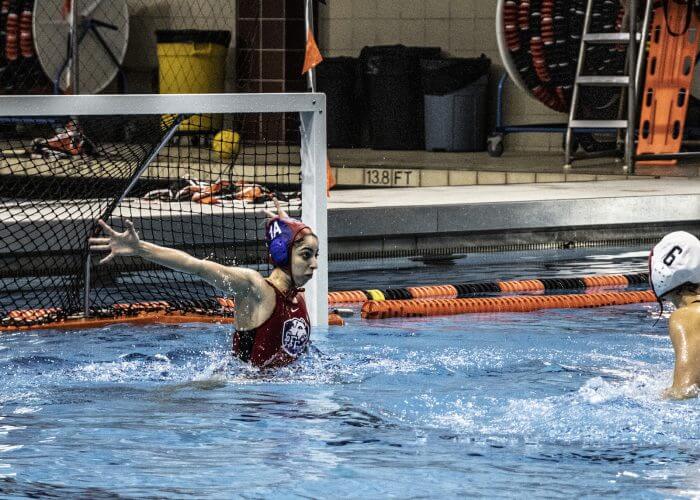
St. Francis goalie Inbar Geva defends against SDSU’s Isabelle Hastings. Photo Courtesy: Nathan Feder
Once we get to our conference games—which should happen in the next three weeks—we’ll be well-rested and more aware of what we need to do to challenge the top teams in our conference and get back to the MAAC postseason.
Right now we’re just trying to give the girls a couple of “Ws.” We’re growing, we’re learning, we’re all on the same page, even if it’s not resulting in wins. there’s a lot of good things going on.
Crawford: Your goalie [Inbar Geva] played extremely well. You challenged us and brought out the best in our team. I commend you for playing up because that’s how you get better.
Burgess: It’s just rough to communicate that with your team when you’re in the middle of playing up against ranked team after ranked team.
– Carin, your team can play defense but they have had trouble scoring. It appears that this year the GCC crown is anybody’s to take.
I really believe in my team, [so] it’s hard to understand how we can play fantastic defense and yet look tentative on offense. Our challenge is to carry the defense into the offensive end [of the pool]. We had good games today and I see what my team is capable of—obviously I see it every day in practice.
This season we jumped out of the gate with a game against Long Beach State, they’re a good team, and we had an opportunity to build some confidence. Coming here and playing Harvard and Princeton indoors on their time zone was challenging.
Clearly, we have some work to do, but when you take the losses, keeping your team together—making sure that they know you’ll keep coaching them. And that you are committed to improving together. When we talk about what we did wrong it’s “we,” not you.
That’s the biggest challenge when you are faced with some early season losses. There’s a long way to go [and] you need to build on what’s positive and the team takes ownership of what we need to do going forward.
And just keep working away. We played UC Santa Barbara, a very good team, and kept the score very low but didn’t score enough to beat them. We can defend well enough to keep the score low but we’ve got to learn how to score some goals ourselves.



